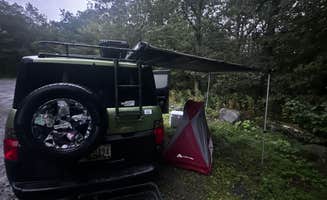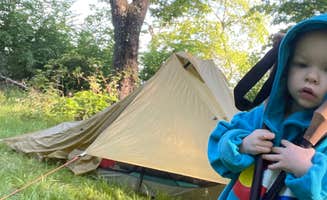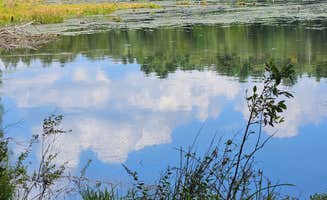Dispersed camping near Gouldsboro, Pennsylvania offers remote, primitive wilderness experiences in the Delaware State Forest and along sections of the Appalachian Trail. The area sits at elevations between 1,200-1,800 feet with a humid continental climate that brings cold, snowy winters and mild summers. Most primitive sites require self-sufficiency with water filtering capabilities and bear-resistant food storage.
What to do
Explore mountain viewpoints: Bake Oven Knob offers a rocky hike to panoramic overlooks along the Blue Mountain ridge. "The hike to the overlook is really lovely; short and rocky," notes Dani T., who frequently uses Bake Oven Knob as a base for Appalachian Trail exploration.
Trek forest trails: Multiple wilderness routes connect through the Delaware State Forest region. "Went down Saw Creek trail to a marsh," reports Jason R. after camping at Thunder Swamp Trailhead. "Tons of hiking" options exist directly from many trailhead parking areas.
Practice hammock camping: Many sites offer excellent tree placement for hammocks. Regarding Designated Backpacker Site 2, a camper notes, "Good trees for hammocking. We had thought there was a shelter (there isn't) but it was fine." The rocky terrain makes hammocks practical alternatives to tent platforms.
What campers like
Solitude options: Campers appreciate the balance between community and privacy. "We camped nearer to others but there are secluded spots too," explains Katharine T. about Appalachian Trail- Designated Backpacker Campsite 2.
Overnight parking convenience: For vehicle-based campers, trailhead lots provide hassle-free options. "Trailhead parking was chill for a night. No trouble," shares one camper about their experience. These gravel areas serve as functional basecamp for hikers and overnight vehicle campers.
Bear protection infrastructure: At established backcountry sites, "Well maintained w bear boxes provided," notes a camper, eliminating the need to hang food. This added security proves particularly valuable during peak black bear activity seasons (spring and fall).
What you should know
Water sourcing challenges: Access to water requires planning at most sites. "No water nearby, and the views are only mediocre," warns a camper. Water sources like Sunfish Pond may require "about a 1 mile round trip" hike from camping areas.
Limited designated sites: Campers should understand forest regulations. "As you enter the Worthington State Forest there are signs and hand painted maps indicating that this is the only place you can sleep in the forest," reports a camper at Hickok Brook, highlighting strict camping zone enforcement.
Rough access roads: Many primitive sites have challenging approaches. "The road is very rough with huge potholes so good clearance is a must," cautions Corey about access conditions. Standard vehicles may struggle during wet weather or winter conditions.
Tips for camping with families
Limited facilities planning: Most areas lack basic amenities. "Bring everything with you. It's a hike back to town," advises Gregg T. Families should pack all essential supplies including toilet paper, waste bags, and sufficient water.
Permit verification: Regulations vary by jurisdiction. "Need a permit on NY state land. Contact Rangers office of whatever county," reminds a camper. Pennsylvania State Forest lands may have different requirements than New Jersey sections.
Small campsite footprints: Many areas have limited space. "It's a little on the small and sloped side for tent camping," notes one reviewer about Appalachian Trail Campsite. Larger family groups may need to split between multiple smaller sites.
Tips from RVers
Vehicle restrictions: Most rustic camping areas have strict limitations. "I drove in thinking that there would be flat places to park a very rugged camper in my full ton diesel pickup," a camper explains, but found "it's not a good spot for car camping" due to access constraints.
Overnight van options: Some trailhead parking areas accommodate small vans. "I've overnighted in my van here a bunch, no problems," shares a van camper using the area as an Appalachian Trail access point. These lots typically have 4-8 parking spaces and no amenities.
Size limitations: Even accessible areas have constraints. "There are only 3 spots where we are. No motor vehicles beyond where I'm camping," explains a camper about site availability. Larger RVs cannot access most rustic camping near Gouldsboro.




